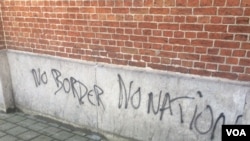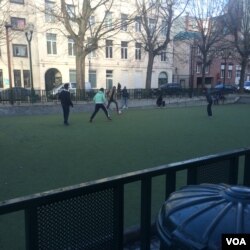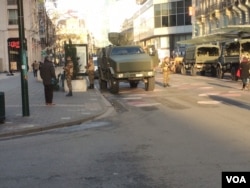By the time he made it from Syria to Europe, 25-year-old Mulham, like many new arrivals, was already distrustful of authorities.
In Croatia, for example, police told his group they were going to a hotel to shower and sleep.
Instead, they were locked inside what smelled like a large barn, and held for seven hours.
"I asked the police what was happening," Mulham said later as we drank coffee at a ramshackle café near a refugee camp in Belgium.
"The officer told me: We don't want you,” he said. "The world doesn't want you.'"
But Mulham feels that, with a degree in architecture and the strength and resources to escape Syria, the comment is unjust. "I will be useful after all," he asserted.
As tanks roll through the streets of Brussels, and heavily armed officers patrol areas they believe will be targeted in what the government calls an "imminent threat" of a terrorist attack or attacks, Mulham remains skeptical.
Many Syrian refugees are afraid of the attacks and depressed to be facing the threat of violence again after fleeing a brutal war, he said. But Mulham and many others simply don't believe there is a threat.
"They want to make the people afraid of us," he said, mulling alternate reasons for the show of force. He considers another possibility: Authorities want to make refugees afraid of backlash from the local people.
And that is the impact the heightened alert is having, regardless of the reason for it, said 19-year-old Adel, a Syrian refugee in Belgium who hopes to one day play football (soccer) professionally. Arab residents and refugees are increasingly distrustful of authorities, and local residents are increasingly distrustful of them, Adel added. The soldiers and tanks guarding the city were not in the neighborhood.
By interviewing landlords, shop owners and others, police recently identified which buildings in his area house Arabs, Adel said. And he's pretty sure the people who changed seats on the bus the other day did so because he and his friend were speaking Arabic.
Adel also doubts the terrorist threat is exactly what it seems, but says that despite the growing distrust and the threat of attacks in Brussels, he will remain in Belgium.
"It's very safe compared to Syria," he said.
Various nationalities fill camps
Most of the news stories about the hundreds of thousands of people moving into Europe from the Middle East and Africa are about Syrian refugees. But Syrians aren't always the largest group in any given camp in Europe. In fact, said Mulham, out of 500 people at his new camp, only 55 are from Syria.
Refugees from three camps in Germany reported similar numbers. On paper, the number of Syrians is inflated because many people claim to be Syrian to increase their chances of getting legal asylum.
But often, neither authorities nor locals dispute these claims, said Karam Osmani, a 22-year-old aspiring entrepreneur from Syria.
"They don't know who's Syrian," he said as he walked by the camp, an old brick military base with elegant towers.
And local people often think everyone living in the refugee camp is Syrian, added Mulham.
"But what about people from Nigeria?" I asked.
"They don't know we don't have black people in Syria," Mulham said. "How would they?"
As a result, the relationship between the community and the newcomers is muddled. People who fear refugees will eat up resources or create security problems think the whole camp is Syrian.
"If any one of us puts trash on the street," Mulham added, "They think it is a Syrian that is dirty."
Passport marks all Syrians
In the security environment following the Paris attacks, one of the main reasons refugee policy is being reviewed in countries around the world is the fear that Islamic State militants could be traveling with refugees and other migrants.
And the main reason the Paris attacks led to calls for rejecting Syrian refugees is a passport found near one of the bodies of the terrorists.
The passport is Syrian, according to authorities, but it is widely believed among Syrian refugees that it must be a fake, possibly planted on the ground before the attack. Fake Syrian passports are reportedly easily obtained for about $1,000.
Even if it is real, the passport appeared to have been planted on the ground by someone who wanted to create a backlash against refugees, possibly the bomber himself, said Adel.
"I don't know why else someone would take his passport if he wants to blow himself up," he explained.As he walked into Brussels' majestic city center from the refugee camp in a more rundown part of the city, he is once again met with military tanks and soldiers.
Karam snapped a picture and texted it to his family.
"If you see a Syrian passport on the street, run away," replied his uncle.
It was a joke. But not really.







